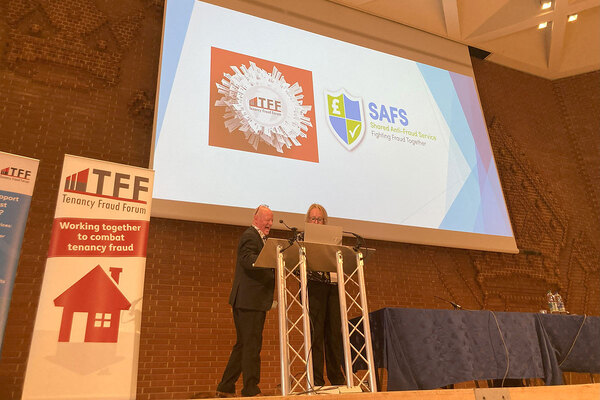School for sleuths
Forward-thinking landlords are training their tenants to scrutinise their performance. Lydia Stockdale discovers how the official qualification for the role can benefit all involved
‘They want me to question what they’re doing and why they’re doing it,’ says Jackie Knott, one of Daventry & District Housing’s newly trained tenant inspectors.
Last month, Ms Knott, along with 18 other tenants in the east midlands, completed the Chartered Institute of Housing’s level 2 certificate in housing.
Last month, the group of tenants, put forward by seven different landlords in the area, completed a 14-week course run by the Just Housing Residents’ Academy, a training organisation that’s part of social housing consultancy Just Housing. Ms Knott and her course mates will find out in a few weeks if they’ve passed and gained the certificate, the equivalent to a GCSE.
Co-regulation - involving tenants in the scrutiny and governance of housing organisations - was a buzz word that ran throughout the Tenant Services Authority’s regulatory framework for England, which came into force in April this year. Housing minister Grant Shapps may want to scrap the regulator, but he’s keen to maintain its standards framework, so training tenants so that they can make an educated and informed contribution is a forward-thinking thing to do.
Close scrutiny
The Residents’ Academy course has been tailored to train tenants as resident inspectors, a role which involves them going out and assessing whether void properties are inhabitable and whether refurbishments are up-to-scratch, and also leading tenant scrutiny committees.
Ms Knott’s landlord, Daventry & District Housing, which took over the ownership of 3,100 homes from Daventry Council in 2007, is a subsidiary of Futures Housing Group - as is Amber Valley Housing, which owns 5,500 homes, also in the east midlands.
Both housing associations put forward two or three tenants to complete the course. It was run over seven sessions, from 10am to 4pm, held every fortnight. They, together with residents from five other housing associations, including Derwent Living and Three Valleys Housing, completed three course work projects, which are now being assessed.
Paul Whittingham, head of housing services at Amber Valley Homes, says he’s already received some valuable insights from the work the tenants did while on the course. ‘They inspected our website, and they’ve already given us ideas for improvement,’ he says. ‘Now we’re able to look through the eyes of tenants. It’s a reality check we’ve not had before.’
Mr Whittingham says his organisation was planning to set up a tenant scrutiny panel when it heard about the Residents’ Academy - putting tenants through a CIH accredited course seemed logical. ‘It can be difficult to choose training providers,’ he explains, but the course this one was offering was ‘accredited and recognised’.
Trisha James, manager of Residents’ Academy, worked in housing for more than 25 years and was responsible for resident involvement at a housing association. She wanted to find a way tenants could obtain recognised qualifications, so she contacted the CIH to discuss the idea. As a result, the Residents’ Academy, which is a standalone business within Just Housing, was set up 18 months ago. It’s run by Ms James and Andrew Jones, the learning manager who designed the course, which is moderated by the CIH.
Value for money
The course is usually delivered from landlords’ own premises and can either focus on training tenants to be resident inspectors or resident researchers - a role which involves gathering information via ‘mystery shopping’ exercises and focus groups.
The price of the course does vary, but on average it costs £12,000 for up to 10 residents and then £750 for every additional tenant.
Groups are usually about 16-strong and gathered from a consortium of housing organisations operating in the same area, which club together to fund the course. The benefit of this is that the social landlords have access to a pool of qualified resident inspectors who can conduct cross-inspection of each others’ services.
‘It’s good value for money,’ says Amber Valley Homes’ Mr Whittingham. ‘We can receive input, not just from our own tenants, but from tenants from other landlords in the region - that’s gold dust for us. It’s been good to work closely with them.’
The toughest part of the whole process, he says, was choosing which tenants should take part in the training. They recruited their three residents as they would anyone else - through shortlists and interviews.
‘We got an awful lot of interest - we could have filled the spaces any number of times,’ he says. ‘And from a younger group of tenants than those who usually engage with us.’
Fully trained resident inspectors and researchers have been as young as 21 and as old as 70, says Ms James. ‘Lots of landlords want to engage with a wider group of tenants and give them an opportunity to achieve a nationally recognised qualification. For many, it’s a first step back into education,’ she says.
Futures Housing Group used the course to develop its own staff. The tenants from Daventry & District Housing and Amber Valley Homes were each appointed a staff buddy - picked from members of staff who do not usually have frontline contact with customers. ‘We got a great response from back-office staff who saw it as a chance for personal development,’ says Mr Whittingham, who is now looking into offering qualifications as a way of getting residents involved in other areas of the organisations.
‘Now we’re thinking tenants could get qualifications in low level debt advice, or counselling and mediation.’
Meanwhile, the Residents’ Academy - which also offers a two-day taster course - is working on offering a CIH level 3 certificate, which will take tenants a step further.
As for Ms Knott, she’s having a couple of weeks off and then she’ll be one of the people working on her landlord’s resident scrutiny panel, The Way Forward Group. They will put together a performance report, showing where they think their landlord is ‘good, and where it’s not so good’.
And now she’s completed the CIH accredited course, she knows all about the TSA’s standards - so she’s aware of her role within a bigger national picture.
Case study: getting qualified
Jackie Knott, 40, was a dental nurse but since having her three-year-old daughter, she’s been a stay-at-home mum. A tenant for 14 years, she’d never been very involved with her landlord, Daventry & District Housing, until she attended a meeting that concerned her home.
The fact that Ms Knott was vocal at that meeting - ‘I wasn’t scared to ask questions,’ she says - was noted. She was asked if she would like to join her landlord’s community panel, which controls a budget of £100,000 a year.
When an advert for resident inspectors was posted with tenants’ rent statements, she applied, went for an interview and got onto the CIH level 2 in housing course.
‘A certificate proves we’ve actually done some recent education,’ she says. ‘I love being a mum, but it’s great to use my brain again.’
Now it’s complete, she’s determined to do a good job as a resident inspector. ‘I felt that they were putting their trust in me as a person and they’ve spent quite a lot of money on the course. It makes me feel confident and valuable.’
She and the other tenants of seven different landlords plan to get together three times a year to report back to one another. As part of the course, which covered discrimination law and fire safety, Ms Knott completed an inspection report of a block of flats - she came at it from a tenants’ perspective, she says. ‘I asked, “Would I move in?”.’







